Hatem Nafti: Kais Saied orchestrates Tunisia’s democratic demise
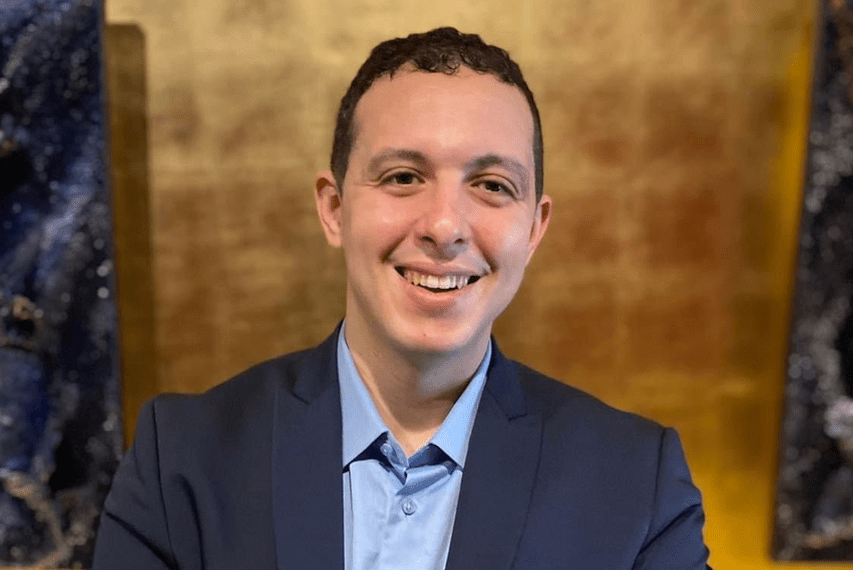
The Tunisian presidential election, which took place on 6 October, was marked by a very repressive and unfair political environment. All public authorities – the government, parliament, judiciary and electoral body – were mobilised to ensure the re-election of 66-year-old incumbent Kais Saied.
In this new book, Our Friend Kais Saied, Essay on Tunisian Democratorship (Riveneuve editions), I look at the restoration of authoritarianism under Saied, the decline of civil liberties as well as the responsibility of local and international actors in the consolidation of autocracy in the country. Below are some extracts from the book.
“…when Saied speaks of the people, he does not mean a majority of citizens or a mass whose critical size can represent the Tunisian population. Saied’s people are those who think like him and support him unconditionally – even if they are a minority”
Tunisian political scientist Mohamed Sahbi Khalfaoui, a specialist in populism, often uses a lapidary expression to describe the Tunisian president: “Kais Saied is not a populist; Kais Saied is a textbook of populism.”
Indeed, if we consider the classic definition of Dutch political scientist Cas Mudde, we see that it applies perfectly to the Saiedian vision. Mudde defines populism as “a thin-centred ideology that considers society to be ultimately separated into two homogenous and antagonistic groups: ‘the pure people’ and ‘the corrupt elite,’ and argues that politics should be an expression of the volonte generale [general will] of the people”. This vision is reflected in Saied’s 2019 campaign slogan “the people want”.

It is important to emphasise that when Saied speaks of the people, he does not mean a majority of citizens or a mass whose critical size can represent the Tunisian population. Saied’s people are those who think like him and support him unconditionally – even if they are a minority. During the online consultation organised in 2022, Tunisians had to choose three reforms deemed priorities among five proposals. The adoption of a new constitution received only 36 percent of the votes, against 38 percent in favour of a partial revision of the fundamental law.However, it was the minority choice that was picked by Saied and the country was given a new fundamental law.
Let us also recall that this consultation, supposed to represent the popular will, only gathered 534,915 participants – barely 5 percent of the electorate – knowing that it was open to segments not entitled to vote during national elections (the armed forces, minors aged 16 to 18). The same applies to the constitutional referendum of 25 July 2022. If the Soviet-style score obtained by the “yes” (94.5 percent) can seem impressive, it goes down to 28.5 percent when related to the electorate.
Bringing justice into line
On 25 July 2021, by listing the “exceptional measures” he had just adopted (freezing parliamentary activities, lifting MPs’ immunity and dismissing Prime Minister Hichem Mechichi), Saied announced his intention to head the public prosecutor’s department. Although this provision was not directly implemented, a methodical undertaking to bring justice into line started. Under the guise of cleaning up the judicial corps, the regime annihilated all guarantees of the judiciary’s independence.
By relegating the judiciary “power” to the rank of a simple “function”, Saied controlled a machine capable of crushing his opponents and creating a climate of terror in society. In this chapter, we will study the different phases of this process of subjugating the most important counter-power that can exist in a democratic society. The bringing of justice into line is undoubtedly the most significant regression since 25 July 2021. Judges are now subject to a double submission. The most obvious is that of an executive who no longer even tries to pretend to respect the independence of justice.
But magistrates are also under the heel of the security forces, who have the ear of the authorities and are capable of breaking the career of any judge.
It should be noted that resistance to this movement is very weak. The Judges’ Union, the most representative body, welcomed the latest transfer movement. (In September 2023, Saied’s justice minister transferred magistrates whose rulings are deemed not compliant with the president’s will, although according to the constitution, they cannot be relocated against their will.) While it is obvious that fear reigns within the ranks of magistrates, repressive policies and the abusive use of custodial sentences are in the DNA of a profession that needs a profound revolution in terms of both training and legislative texts.
The permanent conspiracy
What does the naming of Storm Daniel, artificial intelligence and the shortage of raw materials have in common? They are all, in Saied’s rhetoric, the result of conspiracies. If conspiracy theories are used by many rulers around the world, under Saied, it is a real governing mode. By multiplying conspiracy theories, the ruler offers a reassuring speech which is quite capable of legitimising the government in power.
(These theories) maintain the idea of a generalised conspiracy against Tunisians. They reinforce among some citizens a siege mentality, pushing them to become one with their well-guided leader who, in doing so, is no longer accountable for the deterioration of the socio-economic situation.
By establishing a link between the worsening of the multidimensional crisis and a widespread conspiracy, Saied succeeds in maintaining social peace while continuing to deploy his authoritarian project and to reverse all the liberal advances snatched since the outbreak of the Tunisian revolution (in 2011).
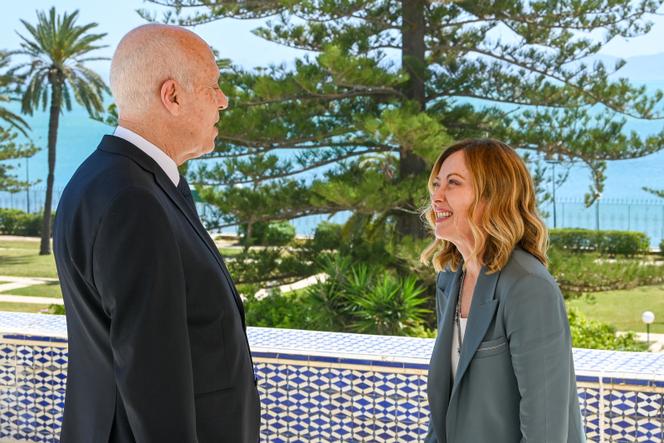
The migration issue and the racist turn
The migration issue is not new in Tunisia. The problems linked to the movements of people between the two shores of the Mediterranean or the “brain drain” phenomenon have constituted challenges for successive governments. But the Saied regime’s approach has completely changed the perception and treatment of the issue. By adopting the “great replacement theory”, the president has exacerbated racial tensions and caused tragedies.
“Indeed, by choosing to adopt a civilisational prism as their main interpretative framework, a majority of western media and leaders have given away the values to which they claimed to be attached.”
Under growing pressure from the far right, European authorities have supported this racist shift. The migration issue has become a central axis of Saied’s policy. It is part of the conspiracy narrative that helps justify the regime’s failures. It makes vulnerable populations, who are victims of discrimination, prevented from leaving for Europe and stuck in Tunisia, into the popular scapegoat.
European authorities, delighted with Tunis’ cooperation, support this policy and turn a blind eye to human rights violations.
READ: How would a 2nd term for Saied look in Tunisia?
Western reactions after 7 October: a gift for despots
“There is a before and an after 7 October 2023”: this standard expression is valid in Tunisia, like elsewhere in the world. Western reactions after 7 October 2023 have gone far beyond the borders of the West. Indeed, by choosing to adopt a civilisational prism as their main interpretative framework, a majority of western media and leaders have given away the values to which they claimed to be attached.
The western double standard has been a real boon for supporters of the rulers in place… Those close to the regime find in this double standard a way to justify their support. By focusing all their statements and actions on the situation in Gaza alone, they dismiss Saied’s embarrassing behaviour, such as the treatment of migrants or the repression of the opposition. They thus revive the old saying: “No voice should be raised above the battle [for the liberation of Palestine].”
READ: Tunisia’s opposition party denounces “political” jailing of leader
But western hypocrisy serves, above all, as the basis for a particularly effective sophism, which consists in saying that if the West denies to this extent the values of liberal democracy and human rights that it claims to defend, it is because these values are obsolete. Instead of criticising the gap between values and their application by westerners, they prefer discrediting these values and justifying their violation by local despots.
An objective alliance is then established between governments that deny their values and dictatorial regimes that jump at the chance to denigrate those same values.
The views expressed in this article belong to the author and do not necessarily reflect the editorial policy of Maghreb.org. Hatem Nafti is a French-Tunisian essayist. He published (in French): Our Friend Kais Saied, Essay on Tunisian Democracy (Riveneuve 2024); Tunisia: Towards an Authoritarian Populism (Riveneuve 2022); and From Revolution to Restoration, Where is Tunisia Going? (Riveneuve 2019). You can follow him on Twitter: @HatemNafti. If you wish to pitch an opinion piece please send your article to alisa.butterwick@maghrebi.org.
Want to chase the pulse of North Africa?
Subscribe to receive our FREE weekly PDF magazine









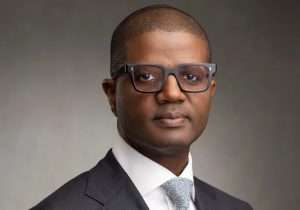

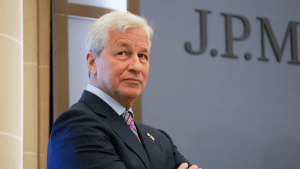


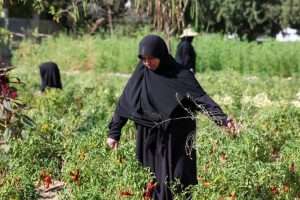
1 thought on “Hatem Nafti: Kais Saied orchestrates Tunisia’s democratic demise”